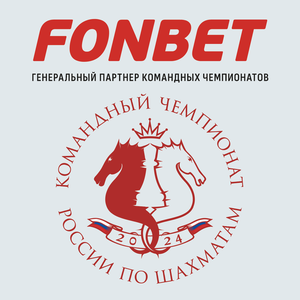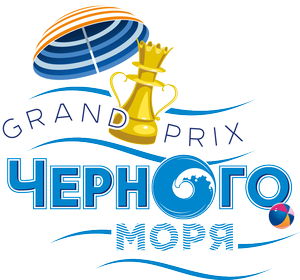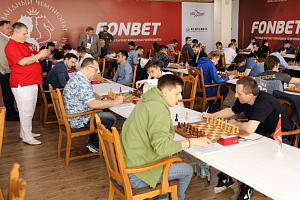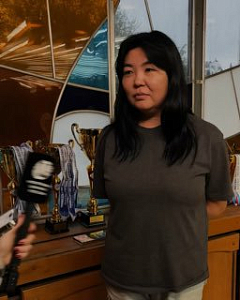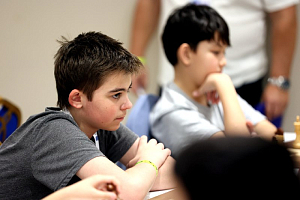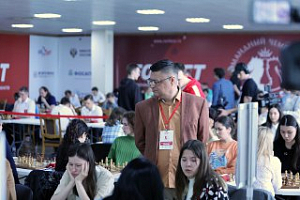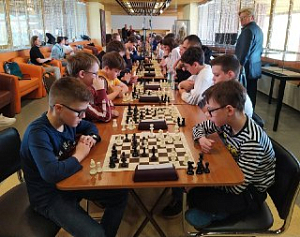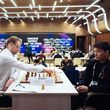9 November 2015
Vladimir Vorozheikin: We Became a Family on the First Evening in Skopje
The captain of Siberia shares his secrets of success with Kirillos Zangalis.

Vladimir Vorozheikin, captain of the European Championship 2015 Cup's winning team, told Kirillos Zangalis, the Russian Chess Federation's PR Director, about the history of his team's establishment and its progress along the champion's path.
- Vladimir, why did you decide to venture upon this project? Why not football, not tennis, not basketball ― why chess and why Siberia?
- To begin with, I am from Novosibirsk, I graduated there (Vorozheikin has four university degrees), and about 18 months ago I moved to Moscow, where I work as Sberbank vice president. In my home town, I was President at the Siberian Bank of Sberbank of Russia. It's a big bank, spanning across five regions of Russia.
And why chess? I really love this game. I played it professionally as a child and a teenager. But I was called up for military service after my second year in the university, and it so happened that I had to forget about chess. We had some real military service there, with a machine gun in the hands, but sometimes I did play chess for the district. Now I play for myself, mostly on the Internet. On one portal, we even set up the Sberbank team, and well-known grandmasters play for it, but I don't want to give their names. That's how the idea to establish the best club in Europe came up. This was about my love for chess, and the debt I owed to Siberia and Novosibirsk.
- There used to be a lot of grandmasters in this city...
- Yes, but they all left it. But now we do have strong players. It's Dmitry Bocharov (he took the fifth place at the last world rapid championship, ahead of most of the elite), and Pavel Maletin. And Maletin, who isn't yet 29, has already been selected as president of the Novosibirsk Chess Federation. And I would really like to support the guy so that people notice him and our sport.
- At first you literally barged into the Russian team championship and won it right off the reel, scoring seven wins in seven matches. That's incredible!
- I am really grateful to Mark Glukhovsky, Chairman of the RCF Board, for including us into the Sochi national championship list. We didn't have a license, but an exception was made for us. Kramnik, Aronian and Jakovenko were invited to join our team. And I think this was a win-win exception. We not only won the Russian gold medal in Sochi, but also made Russia the European champion. And it's been a long time since a Russian club won a European championship.
- Right after the Skopje championship was over, you announced that you never expected a different result. Didn't that sound a bit overconfident, since the "on paper" favorite was Azerbaijan's SOCAR?
- Yes, SOCAR was the highest rated team. But believe me, I handpicked each player on the team, one by one, it's not that I just grabbed every grandmaster rated above 2750. Russia has been unable to win the Chess Olympiad for 14 years, despite having three or four players from the global top ten on its team. And I think this is about psychology and the atmosphere in the team. I undertook this project as a professional manager, and my competences here came in handy. We selected each player very carefully. I consulted the team leader Vladimir Kramnik, and we wanted to see a team of champions, even with Black.
- When did you feel that you succeeded?
- We became a family on the first day in Skopje. I worked on bringing the team together. My role was to create comfortable conditions, and they handled their tasks perfectly by themselves. The team included guys with a champion's spirit: Kramnik, the 14th world champion; Aronian, three-time Olympiad winner; Grischuk, three-time blitz world champion; the Chinese, Olympic champions; Korobov, the Ukrainian champion; Bocharov, who worked real miracles at the last rapid world championship.
- I know that grandmasters are often reluctant to share their personal analyses with each other when they play in a team. But they say there were no secrets in your team. Is this true?
- If you want a concrete example, here it is. What brought us a victory in the decisive match against SOCAR, and maybe in the entire tournament, was the game Grischuk vs. Caruana. This is what Alexander said, perhaps jokingly, after he won the game. He said he didn't do anything on his own: Vladimir (Kramnik) had tipped him on how to get an edge in that opening variation, and he had studied the endgame with a light piece versus two pawns in a book by Pavel (Maletin). Of course he exaggerated that there was no merit of his own, but this is just how a TEAM performs! No one hid analyses in a closet, leaving them for personal tournaments. Everything was shared to bring the victory home.
- Did you celebrate your success on a large scale, did the city shake?
- Well, yeah, Siberian style, it couldn't be otherwise (laughs)! Kramnik was even a bit upset because we had a draw with the Italians in the last round (this outcome made Siberia the champion anyway from the outset). It's incredible, but it's true: since the moment our team was created we had only one draw and we won all the other matches. But this is not so important. The important thing is that the title is back to Russia, so this is a victory of not only Novosibirsk, but also Siberia and the entire Russia.









